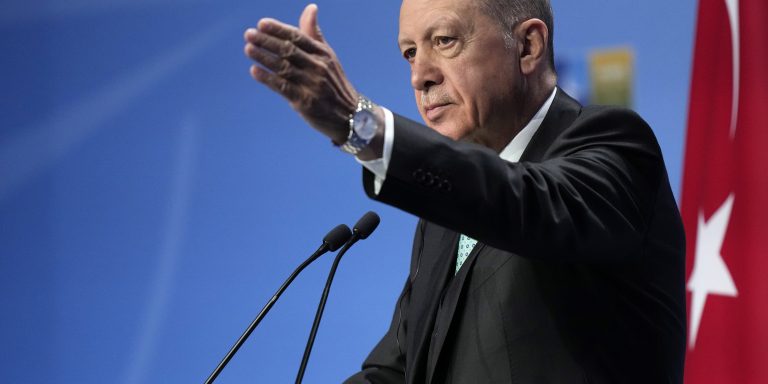INTELBRIEF
July 21, 2023
IntelBrief: The Impact of the Ukraine War on Türkiye’s Relations with Russia

Bottom Line Up Front
- While Turkish President Recep Tayyip Erdogan has consistently positioned himself as capable of mediating between Russia and the West—often extracting valuable concessions in the process—his recent about-face on Sweden’s NATO entry may impair Ankara’s relationship with Moscow.
- Ankara’s sale of drones to Kyiv and its release this month of five Azov commanders who fought at Mariupol last year have created tension between Türkiye and Russia since the outbreak of the war in Ukraine.
- While Erdogan has skillfully balanced NATO, Russia, and Ukraine during the conflict—all while running for and successfully winning re-election—the Turkish leader may have run afoul of many in Putin’s inner circle.
- Türkiye’s decision to welcome Sweden into NATO sends a strong message to Russia while also demonstrating its growing leverage, not only in relation to Russia and Ukraine, but also within the treaty alliance.
Russia’s illegal invasion of Ukraine has set in motion a chain of events that have significantly impacted longstanding alliances, leading to the expansion of NATO and closer partnerships between a rogue’s gallery of nations. Even though Türkiye is not a party to the conflict, Ankara has often found itself in the middle of high-profile events related to the war. And while Turkish President Recep Tayyip Erdogan has consistently positioned himself as a statesman capable of mediating between adversaries—often extracting valuable concessions in the process—his recent about-face to allow Sweden into NATO has led to turbulence in Ankara’s relationship with Moscow. Russian lawmakers and hardline nationalists denounced Erdogan, who publicly suggested that Ukraine also deserved to be a NATO member at some point in the future. The Kremlin was also particularly irate when Erdogan allowed the leaders of the May 2022 Azovstal steel plant siege in Mariupol to return home to Ukraine from Türkiye with Ukrainian President Volodymyr Zelenskyy earlier this month, in what Moscow claims is a violation of a prisoner exchange deal brokered by Türkiye last September.
There have been a number of other points of tension between Türkiye and Russia since the Kremlin launched its invasion of Ukraine in February 2022. Türkiye has sold Bayraktar TB-2 drones to Ukraine, allowing Kyiv to improve precision strike capabilities vastly. There have been rumors that Türkiye will supply T-155 Firtina self-propelled howitzers to Ukraine as well, contributing to Kyiv’s ongoing counteroffensive, which has been slow to advance in the face of heavily mined Russian defensive positions. But Türkiye’s approach in Ukraine has been complex and multidimensional. While Ankara has at times been supportive of Ukraine, Turkish entities have also been sanctioned by the United States for helping Moscow circumvent U.S. sanctions. Notably, Türkiye did not join the U.S. sanctions coalition that has been aligned against Moscow since the war broke out. And for the most part, Putin and Erdogan have maintained a close working relationship. Several years ago, and much to the dismay of fellow NATO members, Türkiye agreed to purchase the S-400 missile defense system from Russia, leading to Ankara’s ejection from the F-35 fighter jet program.
To his credit, Erdogan has skillfully balanced multiple sides in this conflict—NATO, Russia, and Ukraine—all while running for and successfully winning re-election in May, although it now seems that the Turkish leader may have run afoul of many in Putin’s inner circle. Russia and Türkiye have staked out opposing sides in several ongoing conflicts, including Syria, Libya, and Nagorno-Karabakh. At the same time, Ankara was viewed by Russia as a sufficiently trustworthy interlocutor to help mediate the Black Sea grain deal (before Russia withdrew from the agreement this week). Building off this, Erdogan had also told Putin in September 2022 that his country was willing to mediate negotiations over security at the Zaporizhzhia nuclear power plant. Türkiye understands that it must continue its careful balancing act given its current economic crisis, which has led to its increased dependence on foreign currency, of which Russia is a significant provider. Russia, of course, also understands its need for the unconventional trade routes that Türkiye provides. And so, analysts believe that a substantial deterioration in the two nations’ relations in the near future is unlikely. In fact, Moscow admittedly understands Türkiye’s “obligations” to NATO. A Kremlin spokesman remarked that Russia had no illusions about Ankara’s responsibilities to the treaty organization.
Many observers believe that Türkiye works to actively prolong the war in Ukraine. A completely weakened Russia serves no purpose to Türkiye, which understands that its unique relationship with the Kremlin provides it with leverage over its NATO allies. However, by keeping Russia occupied in Ukraine, Türkiye reduces Russia’s ability to exert economic pressure or assert its power in Türkiye’s sphere of influence. A weakened Russia would have fewer means to challenge Türkiye in many of the aforementioned conflicts that the two states find themselves opposing one another. With this in mind, Türkiye’s decision to finally grant Sweden entry into NATO sends a strong message to Russia while also demonstrating its growing leverage, not only in relation to Russia and Ukraine, but also within the treaty alliance. Although only time will tell whether this move will pave the way for Türkiye’s EU accession, the current prospects appear unlikely. Nevertheless, Türkiye’s influence within NATO and its expanding role in the Ukrainian conflict further bolster Ankara's power. While some analysts believe that Türkiye’s westward shift is primarily driven by its economic crisis, it appears that it will also receive military benefits: one day after Sweden’s acceptance into NATO, the U.S. announced it would proceed with the transfer of F-16 fighter jets to Türkiye. The move also positions the country as a prominent geopolitical force. Türkiye’s evolving relationship with Russia is indeed further evidence of its ability to balance opposing sides while boldly pursuing its national interest.